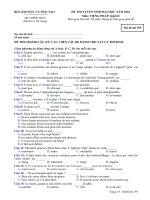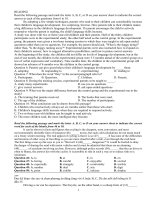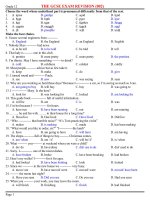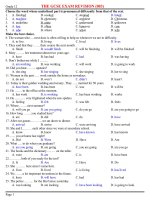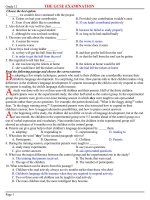GCSE 395
Bạn đang xem bản rút gọn của tài liệu. Xem và tải ngay bản đầy đủ của tài liệu tại đây (75.3 KB, 5 trang )
SƠ GD&ĐT VINH PHUC
TRƯƠNG THPT LIÊN SƠN
(Đề thi gồm: 05 trang)
ĐỀ KTCL ƠN THI THPT QUỐC GIA NĂM 20182019
Mơn: TIẾNG ANH – ĐỀ SỐ 395
Thời gian làm bài: 60 phút, không kể thời gian phát
đề
Ho va tên thi sinh:……………………………………………………………………. SBD:…………………………
Mark the letter A, B, C, or D on your answer sheet to indicate the word that differs from the
other three in the position of primary stress in each of the following questions.
Question 01: A. inevitable
B. insecticide
C. innovate
D. incident
Question 02: A. poisonous
B. disastrous
C. religious
D. infectious
Mark the letter A, B, C, or D on your answer sheet to indicate the sentence that best completes
each of the following exchanges.
Question 03: ~ Liz: "Is it time for us to leave?" ~ Dick: "______________"
A. not yet
B. not ready
C. not already
D. still not
Question 04: ~ Patrick: "Will you be able to come to the meeting?" ~ Joan: "______________"
A. I'm sorry not.
B. I'm not afraid so.
C. I'm afraid not. D. I'm sorry that "no".
Read the following passage and mark the letter A, B, C, or D on your answer sheet to indicate
the correct answer to each of the questions from 05 to 10.
THE IMPORTANCE OF WATER
More than two-thirds of the Earth's surface is covered with water. Water is essential to life.
Neither plants nor animals can live without it. Although we are surrounded by water, only less
than three per cent of this water is fresh water, which is important to us. We need fresh water to
irrigate our crops, and plants and animals need it to survive.
Water has become one of the most important sources of energy. In the olden days, we used
steam to move engines of ships and trains. Then we discovered hydro-electricity. This meant that
there was no need to burn fuel to produce electricity. Fast-running water turned the turbo engine
and this in turn produced energy like electricity. There was less pollution in the process. Later, we
built dams alorg rivers to ensure that there was fast-running water and we also made use of tidal
waves. Sad to say, man has polluted the water which he needs. For years, we have been polluting
our water. We use water to flush our waste and we use rivers as sewers to carry our wastes away.
We dump rubbish into the lakes and oceans, thinking that it will be safe. Not only that, many
industries have dumped unwanted chemicals and toxic substances into the sea. This is because it
is cheaper than recycling.
Oil slicks are another major problem. The oil does not degenerate but floats on the surface
and prevents oxygen from entering the sea. Thousands of aquatic animals and birds have died
because of this. We must protect the water from further pollution, or we will be the ones to suffer
for our ignorance.
Question 05: Besides enabling our survival, water can also be used_______.
A. to produce electricity
B. to wash waste materials
C. as a dumping ground
D. as a sewage system
Question 06: This passage may be found in_______.
A. a scientist’s book B. an exam paper
C. a scientific report
D. a magazine
Question 07: About_______ of the earth's surface is approximately made up of land.
A. one whole
B. two-thirds
C. half
D. one-third
Question 08: The word 'flush' is closest in meaning to_______.
A. clean up
B. empty waste
C. tidy up
D. clear up
Question 09: People treat the ocean as a dumping ground_______.
A. so that the refuse will dissolve in the ocean
B. so that the fish can eat the refuse
C. so as to cut costs
D. because the ocean is vast and has no other uses
Question 10: Water is precious though it is in abundance because_______.
A. it is salt water and not fresh water that is in abundance
B. water is very hard to produce
C. water turns bad easily
D. water can only be used once
Read the following passage and mark the letter A, B, C, or D on your answer sheet to indicate
the correct word or phrase that best fits each of the numbered blanks from 11 to 15.
THE IDEAL JOB
A government research agency recently carried out a survey in which 15,000 people in the
UK were asked the question: 'What would be your ideal job?' Incredibly, around 60% of those who
(11)_______ in the questionnaire gave the same answer. It may (12)_______ as a surprise to anyone
who actually works in the business, but these people all thought they would like to be writers.
Although no data is available to (13)_______ their reasons for choosing this particular
occupation, it seems that what appeals to these people is the lifestyle that they imagine a writer
leading. Writing work is often done from home, with no (14)_______ timetable and so can be
combined with family commitments and other activities.
In reality, of course, the lifestyle isn't so very glamorous. Most writers work on a freelance
(15)_______ and so have no regular salary to rely on, challenging deadlines are the norm, and only
the most successful of them can expect to make a living from it.
[Source: FOCUS, Practice Test Plus, Pearson, 2016]
Question 11: A. filled
B. completed
C. answered
D. applied
Question 12: A. sound
B. result
C. seem
D. come
Question 13: A. account
B. inform
C. explain
D. refer
Question 14: A. fixed
B. solid
C. stuck
D. heavy
Question 15: A. method
B. system
C. basis
D. way
Mark the letter A, B, C, or D on your answer sheet to indicate the word(s) OPPOSITE in
meaning to the underlined word(s) in each of the following questions.
Question 16: Things were going well for her till she fell foul of the director.
A. fell in love with B. subscribed to
C. had a dispute with D. had a disagreementwith
Question 17: No one was sure whether Ron will come to the party or not.
A. curious
B. doubtful
C. ignorant
D. certain
Mark the letter A, B, C, or D on your answer sheet to indicate the sentence that is closest in
meaning to each of the following questions.
Question 18: I never hear him shout at his children.
A. He is never heard to shout at his children. B. His shouting at his children are never
heard.
C. His children are never heard to shout at. D. He is never heard shout at his children.
Question 19: After many years of hard work, he retired.
A. After his hard work for many years, he retired.
B. After his many hard-working years, he retired.
C. After he had worked hard for many years, he retired.
D. After he was hard-working for many years, he retired.
Question 20: She awoke with a feeling of terror.
A. When she felt terrified, she had awoken.
B. When she awoke she felt terrified.
C. When she felt terrified enough, she awoke.
D. When she felt terrified, she awoke.
Read the following passage and mark the letter A, B, C, or D on your answer sheet to indicate
the correct answer to each of the questions from 21 to 28.
LOHRI, THE BONFIRE FESTIVAL
On January 13th, deep in the cold of midwinter, the people of northern India and especially
the Punjab region, celebrate the colourful winter fertility festival, Lohri. The origins and reasons
for this bonfire festival have been lost in the mists of time, but they are associated with a number
of fables and folk legends. One of these is a Punjabi version of Robin Hood, about a great warrior
called Dulla Bhatti. Dulla Bhatti had rebelled against the king and he used to rob the rich and
rescue poor girls who had been kidnapped and were about to be sold in foreign slave markets.
Dulla is a great heroin Punjabi tradition.
Another belief about the Lohri tradition is that it began as a celebration of the eve of the
winter solstice, or the shortest day of the year. This is despite the fact that the festival takes place
three weeks after the official and scientifically accepted date of the winter solstice on 21 st
December. But whatever the case may be, everyone agrees that Lohri celebrates the end of the
long cold dark winter months and the beginning of the new farming year and that it's a festival
that brings everyone together, irrespective of their religion.
On the day of Lohri, children go from door to door singing traditional songs. Many praise
the great hero Dulla Bhatti and others are humorous nonsense songs only sung for Lohri. In
return for the entertainment, the children receive gifts known as Lohri. These are collections of
tasty treats made up of many ingredients such as sesame seeds, peanuts, sweets and other
goodies. Later on, during the evening's festivities, the children will give out some of the treats they
hive received and share their bounty with others. One of the reasons for this custom is that the
Lohri festival is closely associated with the approaching harvest of winter crops (rabi ơops) such
as wheat, barley, peas and mustard. Apart from distributing treats to children, people take a
variety of foods to temples and other places of worship in order to ensure a good crop.
Later in the day, people dress up in their finest and most colourful clothes. The women in
rich silk saris and the men in delicately embroidered jackets. As dusk begins to fall, large bonfires
are lit in the towns and villages all over the territories of northern India. Then people toss sweets
and sesame seeds into the fire and sing songs as the men dance the lively Bhangra dances around
the fire. Some people also throw milk and water around the fire or perform prayers in honour of
the sun god and to ask for his protection in the coming farming year.
After the singing and dancing, when the ceremonies are over and the fire has died out,
people take the embers from the bonfire to light a new fire in their homes. They believe the
embers will help keep them and their animals healthy and they will also help to ensure a good
harvest in the coming months. Then friends and relatives meet to exchange gifts and distribute the
goodies collected earlier in the day. A traditional dish of Indian curry with mustard leaves and
spinach is prepared and is served with a traditional type of bread made from a variety of different
seeds. The fun and feasting usually continues late into the night. The following day is believed to
be a favourable day to take a holy bath in the river and practise charity, Lohri is more than just a
festival, it is a celebration of the gift of life.
[Source: ON SCREEN, Intermediate, B1+ / B2, Express Publishing, 2010]
Question 21: Lohri is_______.
A. celebrated only in the Punjab region
B. a national holiday in India
C. an international festival in India
D. a seasonal regional festival
Question 22: People light bonfires_______.
A. at sunset
B. before dressing for the ceremonies
C. only in the countryside of north India D. late in the evening
Question 23: People believe the embers they take home will help_______.
A. them acquire more animals
B. them keep their home fires burning
C. cure them of illnesses
D. their crops to grow
Question 24: The day after Lohri is considered a good day to_______.
A. bathe in the sea B. make a donation C. cook a curry
D. continue feasting
Question 25: Which of the following is closest in meaning to “in return for”?
A. to substitute for B. to pay back
C. when coming back from D. in exchange for
Question 26: During the ceremonies, only men_______.
A. perform the ritual dances
B. throw sweets and seeds in the fire
C. say the prayers to the sun god
D. sing songs at the bonfire
Question 27: Dulla Bhatti_______.
A.used to kidnap girls
B. was an enemy of the king
C. sold poor people to slave markets
D. is another name for Robin Hood
Question 28: Many people believe that Lohri_______.
A. is the shortest day of the year
B. is a festival for people of all religions
C. is the official winter solstice
D. is not a religious festival
Mark the letter A, B, C, or D on your answer sheet to indicate the correct answer to each of the
following questions.
Question 29: _______ love is________ very strong feeling of affection towards someone who you are
romantically attracted to.
A. The/ the
B. The/
C. A/ the
D. / a
Question 30: The jurors were told to_______.
A. make lots of expressions
B. speak freely
C. talk all they wanted
D. talk with their minds open
Question 31: The families were told to evacuate their houses immediately_______.
A. in the time when the water raised
B. when the water began to rise
C. at the time when the water began to go up
D. when up was going the water
Question 32: Rarely_______ last longer than an hour.
A. tornados that
B. tornados
C. do tornados
D. tornados do
Question 33: Bacteria may be round, _______ , or spiral.
A. rod shapes
B. like a rod's shape
C. in the shape of rods D. rod-shaped
Question 34: _______ play Alison’s House, the author Susan Glaspell won a Pulitzer Prize in 1931.
A. By her
B. It was her
C. Her
D. For her
Question 35: There are believed_______ over 300 species of trees in El Yunque rain forest in Puerto
Rico. A. being
B. there are
C. to be
D. they are
Question 36: _______ get older, the games they play become increasingly complex.
A. Children
B. For children to
C. Children, when they D. As children
Question 37: Those students do not like to read novels_______ text books.
A. in any case
B. forgetting about C. much less D. leaving out of the question
Question 38: He_______ looked forward to the new venture.
A. eagernessly B. eagerly
C. with great eagerness D. in a state of increasing eagerness
Question 39: When Jane won the prize, I_______ her on her success.
A. rejoiced
B. approved
C. appreciated
D. congratulated
Question 40: He entered a university________.
A. when he had sixteen years
B. at age sixteen years old
C. when sixteen years were his six
D. at the age of sixteen
Question 41: Everyone knows that these two firms have been in fierce_______ to get the job of
running the hotel.
A. involvement
B. management
C. arrangement
D. competition
Mark the letter A, B, C, or D on your answer sheet to indicate the word(s) CLOSEST in meaning
to the underlined word(s) in each of the following questions.
Question 42: Despite weeks of media speculation, the president refused to tip his hand about his
plans for re-election.
A. announce
B. publicize
C. certify
D. make known
Question 43: It’s too expensive for me. I can’t afford it.
A. pay for
B. spend
C. cost
D. save
Mark the letter A, B, C, or D on your answer sheet to indicate the word whose underlined part
differs from the other three in pronunciation in each of the following questions.
Question 44: A. play
B. mayor
C. stay
D. tray
Question 45: A. purchase
B. replace
C. palace
D. surface
Mark the letter A, B, C, or D on your answer sheet to indicate the underlined part that needs
correction in each of the following questions.
Question 46: Despite of modern medical technology, many diseases caused by viruses are still not
curable.
A. many
B. Despite of
C. by viruses
D. not
Question 47: Though Pablo Picasso was primarily a painting, he also became a fine sculptor,
engraver, and ceramist.
A. Though
B. painting
C. fine
D. primarily
Question 48: People who live in small towns often seem warmer and more friendly than people
who live in populated densely areas.
A. small towns
B. who
C. populated densely
D. seem
Mark the letter A, B, C, or D on your answer sheet to indicate the sentence that best combines
each pair of sentences in the following questions.
Question 49: I like her. I wouldn't want to spend a lot of time with her.
A. Since I like her, I wouldn't want to spend a lot of time with her.
B. I like her or else I wouldn't want to spend a lot of time with her.
C. However I like her, I wouldn't want to spend a lot of time with her.
D. I like her while I wouldn't want to spend a lot of time with her.
Question 50: They disobeyed the teacher. They had to stay behind after school.
A. They disobeyed the teacher; they had to stay behind after school, though.
B. They disobeyed the teacher; however, they had to stay behind after school.
C. They disobeyed the teacher; as a result, they had to stay behind after school.
D. After they disobeyed the teacher, they had to stay behind after school.
_________THE END__________
